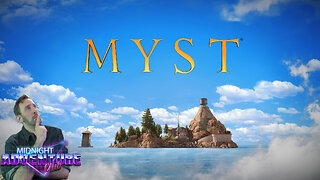Premium Only Content

Why Evil Must Be Invited In: Thresholds, Demons, and Ancient Protections
Why is evil always waiting at the door? Why must it be invited in?
From ancient Mesopotamian rituals to Jewish mysticism, Roman household spirits to Christian theology — this episode explores the powerful and haunting idea that spiritual evil cannot act without permission. Across cultures and centuries, the threshold has been seen as sacred — the line between chaos and safety. And what crosses it… is often what we allow.
In this Monday deep-dive, we explore:
The demonology of Sumer, Akkad, and Babylon
Ritual protections from the Maqlû series and Udug-hul tablets
The lurking Rabisu and night demon Alû
The Hebrew Bible’s laws of purity and the role of sin
The Testament of Solomon’s interviews with demons
Roman household rites and gods like Janus and the Lares
Christian views on free will, consent, and temptation
Kabbalistic ideas of the dybbuk and divine name amulets
Protective symbols used across world cultures
🔒 Evil doesn’t break in. We let it in.
So… have you locked your doors?
🕯️ New episodes every Monday, Wednesday, and Friday
🔔 Subscribe to uncover forbidden faiths, lost rituals, and ancient truths.
👇 Let us know in the comments — What beings do YOU know of that need permission to act? Your reply might be featured in a follow-up!
—
📚 Sources & References:
Mesopotamian Texts & Studies:
Maqlû Series (Babylonian exorcism rituals, c. 7th century BCE)
Udug-hul Incantation Series (Sumerian/Akkadian, c. 2000 BCE)
Tablet K.241 (British Museum)
State Archives of Assyria Vol. 3 (SAA 3, Ritual Texts)
The Exorcist’s Manual (KAR 44, Library of Ashurbanipal)
Hebrew & Jewish Sources:
Leviticus 17–20 (Ritual Purity Laws)
Deuteronomy 18:9–12
1 Enoch (Chapters 15–16)
Babylonian Talmud, Berakhot 61a (On the yetzer hara)
Etz Chaim by Isaac Luria
Sefer Ha-Razim (Book of Mysteries, ancient Kabbalistic text)
The Book of Protection (Aramaic amulet texts)
Greco-Roman Texts:
Testament of Solomon (Greek-Jewish pseudepigrapha, 1st–3rd century CE)
PGM IV, Greek Magical Papyri (associated invocation spells)
De Agricultura by Cato the Elder
Fasti by Ovid
Christian Theology & Writings:
1 Peter 5:8
Origen, Contra Celsum
Augustine, City of God (Book 10)
Cultural Practices & Ethnography:
Traditional use of Mezuzahs, salt lines, horseshoes, icons, incense, protective knots
Ethnographic and folkloric studies on domestic ritual defense
—
📺 Chapters:
00:00 – Intro: The Threshold Rule
01:03 – Mesopotamia: First Boundaries
03:17 – Demons That Wait at the Door
04:30 – Sin as Spiritual Invitation
05:48 – Testament of Solomon: Consent and Control
06:50 – Roman Threshold Gods & Household Spirits
07:38 – Christian Views: Evil Requires Willingness
08:25 – Kabbalah & the Dybbuk
09:23 – Global Protective Practices
10:07 – Conclusion: Evil Doesn’t Break In
—
🎙️ Voice & Script: Jacob Nelson (Faith & Heresy)
📅 Published: [Insert Date]
📧 Business Inquiries: [Insert contact]
#demonology #history #kabbalah #ancientrituals #exorcisme
By Tulip Hysteria / Go to albums - https://www.flickr.com/photos/36417567@N03/32380012237/, CC BY 2.5, https://commons.wikimedia.org/w/index.php?curid=111521078
-
 21:57
21:57
GritsGG
15 hours agoBO7 Warzone Patch Notes! My Thoughts! (Most Wins in 13,000+)
49 -
 2:28:08
2:28:08
PandaSub2000
8 hours agoMyst (Part 1) | MIDNIGHT ADVENTURE CLUB (Edited Replay)
80 -
 1:12:43
1:12:43
TruthStream with Joe and Scott
5 days agoJason Van Blerk from Human Garage: Reset your life with Fascial Maneuvers,28 day reset, Healing, Spiritual Journey, Censorship, AI: Live 12/3 #520
4.62K4 -
 24:21
24:21
The Pascal Show
1 day ago $8.25 earned'CHALLENGE ACCEPTED!' TPUSA Breaks Silence On Candace Owens Charlie Kirk Allegations! She Responds!
27.2K13 -
 17:41
17:41
MetatronGaming
2 days agoI should NOT Have taken the elevator...
34 -
 LIVE
LIVE
Lofi Girl
3 years agolofi hip hop radio 📚 - beats to relax/study to
1,369 watching -
 1:20:23
1:20:23
Man in America
12 hours agoHow Epstein Blackmail & FBI Cover-Ups Are Fracturing MAGA w/ Ivan Raiklin
178K26 -
 2:13:49
2:13:49
Inverted World Live
7 hours agoSolar Storms Ground 1000 Planes | Ep. 151
106K6 -
 2:54:08
2:54:08
TimcastIRL
7 hours agoJ6 Pipe Bomb Suspect ARRESTED, Worked With BLM, Aided Illegal Immigrants | Timcast IRL
249K124 -
 3:59:02
3:59:02
Alex Zedra
6 hours agoLIVE! Bo7 Warzone
33.4K1